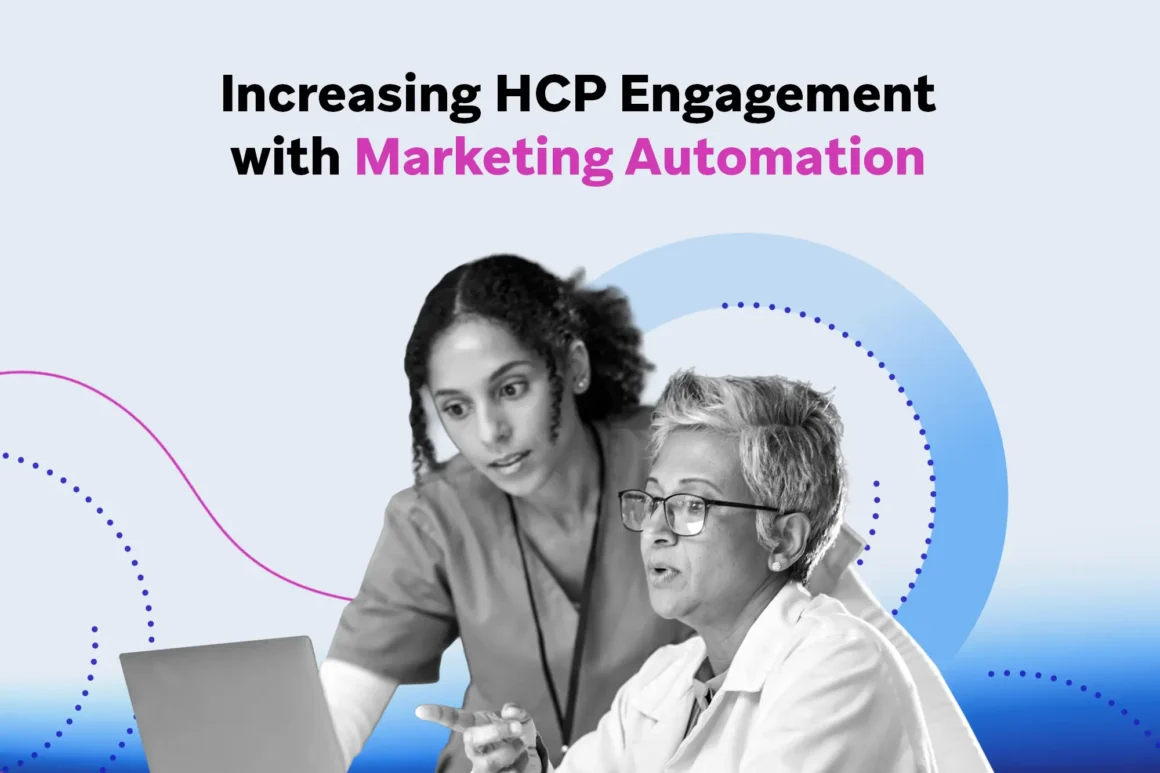The HCP engagement landscape is changing. What used to be an industry dominated by sales reps is growing increasingly direct, bringing healthcare professionals in direct contact with the companies that might better serve them. According to one survey, 50% of HCPs could even “imagine a world without a sales rep.”
What does that mean for the future of pharmaceuticals? It means you have to be ready to engage HCP on their own level. It also means that you have to have the digital infrastructure necessary to automate these processes to allow for engagement without reps as the go-between. If you’re going to compete, you’re going to need to incorporate marketing automation processes in your own outreach efforts. As Seismic notes, “60 percent of companies with over $500M revenue have adopted a MAP”—or a Marketing Automation Platform.
The only question that remains: how?
Marketing automation software is where the industry is heading. But let’s get specific about what marketing automation means in the health care and pharmaceutical industries, and how you might leverage your own marketing automation efforts to increase HCP engagement. Doing so may yield the results of a motivated team of sales reps—without the expense of one. Here’s how.
Strategy #1: Email Automation Might Promise the Highest ROI
Perhaps the best place to invest your automation focus is in the realm of email marketing, which traditionally pays out one of the highest ROIs in modern digital strategy. According to HubSpot, email marketing can pay out as much as $38 for every $1 spent—and a chief reason that an estimated $350 million was spent on email marketing in the U.S. alone in 2019.
That works from a generic, all-things-marketing standpoint. But is email marketing automation suited for HCP engagement? The “Medical, Dental, and Healthcare” industry typically returns open rates of over 20%, according to MailChimp, which means your HCP engagement is not exempt from good email automation tactics. Let’s look at some great ways to integrate email into your marketing automation efforts:
- Use automation to optimize your email timing. According to Advertising.LWW.com, “when you send the email is just as important as what you’re saying in the message.” They recommend investing in email software that lets you view these analytics and automate your email marketing to send at the times with the highest open rates for your HCP targets.
- Make full use of the full suite of email automation strategies. 50% of survey respondents now use A/B testing in their email automation software, while 48% employ some form of marketing automation. Over one-third also use personalized content marketing through the use of email marketing. What does this mean for you? Installing the email marketing infrastructure that makes automation possible will help you access HCPs with more personalization and more effectiveness than many other methods.
Strategy #2: Investing in Content that Naturally Leads to More HCP Engagement
Healthcare professionals are like any other group—they’re going to gravitate towards one type of content over another. Your job in marketing automation is to create content that they’ll naturally gravitate to—and then proceed to create and promote that style of content in your marketing automation efforts.
Let’s take a look at the stats and find out what HCPs are currently looking for:
- According to PharmaPhorum, HCPs naturally gravitate towards educational tools: “a total of 88 percent of HCPs reported accessing diagnostic tools at least once per month and 66 percent reported needing better access. However, 31 percent of pharma respondents reported not providing them.”
- Incorporate mobile-friendly services. The majority of HCP use multiple devices every day, with 69 percent using a mobile phone that often. The majority also used a tablet every day. You should also note that marketers looking at the numbers have noted a 133% increase in mobile device usage when HCPs are conducting pharmaceutical research. Is your HCP outreach platform ready to accommodate that kind of research?
If you aren’t investing in the sort of content that engages HCPs most often, then you can’t expect to attract them as leads. But if you build a platform specifically with the HCPs and their issues in mind, you’ll be able to create a sustainable outreach program that engages them and nurtures them as leads for long-term success.
Strategy #3: Optimize Your Marketing Automation Channels to Suit HCP Preferences
It’s not just the content that requires catering to the HCP market. It’s the medium through which you communicate that content.
- Avoid information overwhelm. One McKinsey survey in 2014 found that pharmaceutical companies would “launch 400 new products over the following three years,” representing an increase of 146% over a similar period in 2005. The result? HCPs will increasingly be overwhelmed by marketing information, new products, and an onslaught of pharmaceutical companies competing for attention. Your goal should be to avoid this information overwhelm. More on that in the next points.
- Go digital. One of the advantages of using marketing automation is that it allows you to scale your digital outreach. And make no mistake—this is more important than ever. As AffinityMonitorTM notes, “More than half (53%) of marketing outreach to physicians now takes place through ‘non-personal’ promotion, such as email and mobile alerts, as well as direct mail and speaker programs.” Although that includes direct mail and speaker programs, you’ll also note how email and mobile alerts are becoming more prominent.
- Rich content. HCPs conducting research will always want rich, detailed, powerful content. They want to be sure that they have the information necessary to make highly educated decisions. If you don’t deliver that to them, no amount of marketing automation is going to overcome what they see as a lack of information. As HealthCasts notes, “Rich, robust content will position your brand as a credible resource.”
You shouldn’t invest in marketing automation channels without some working knowledge of how HCPs would like to engage with you. They have their own preferences. They have their own habits. And if you aren’t meeting them at eye-level, you can only expect that you won’t have the engagement rates you could otherwise inspire.
Strategy #4: Use Marketing Automation to Eliminate the Flaws in Your HCP Outreach
No strategy is perfect. Your own HCP outreach may be optimized to suit your audience, but there are still going to be blind spots. Marketing automation can help smooth over some of these flaws and incorporate new practices that make things smoother from the HCP’s point of view, which increases the likelihood that they’ll want to work with you.
Let’s look at some of the automation processes that can be used to eliminate the following problems with HCP outreach:
- Scheduling problems. “Gaining in-person access to physicians is becoming increasingly difficult because of a shortage of HCPs in the U.S., an increasingly competitive market, and a rise in bureaucratic processes that limit the number of hospital buyers,” notes SalesForce Pardot. Marketing automation can allow you to create a “lead nurturing” program that keeps HCPs engaged without feeling like they’re being ignored when there’s a scheduling problem. Today’s users expect updates on their latest scheduling quirks. If you don’t provide that for them with your marketing automation, you may lose out HCP engagement to those platforms that do.
- Retargeting. The traditional “sales rep” model can lead to some blind spots. If a sales rep feels that an HCP is a “dead lead”—i.e., a lead that is no longer interested in what the sales rep has to say, then the sales rep is no longer inclined to engage with that HCP. But what if not all of these dead leads were dead leads? Marketing automation with tracking and follow-ups on “dead leads” prevents these HCPs from slipping through the cracks. You never know why an HCP lead might not fail to follow up, but with the right automation software, you don’t have to wonder. You can let the platform do it.
- Lead prioritization. Let’s say your marketing team does have plenty of HCP leads coming into the system. What happens when your system is overwhelmed? If you fail to prioritize leads, you may not be able to capitalize on those HCPs who are most engaged. Marketing automation can help with lead prioritization so that the pharmaceutical sales team is able to follow up on the warmest of leads—those leads that are furthest along in the automated marketing pipeline.
With the proper strategies in place, you’ll lose far less business, increasing your overall engagement. After all, you work hard to reach out to new HCPs. You want to be sure that your campaigns are optimized for their engagement. When you lose out on potential leads because of an inefficient system, it’s like throwing that money away. It’s better to invest in a sophisticated marketing automation system that will reduce this waste.
Strategy #5: Align HCP Engagement Goals with the Proper Platform
None of this matters if you don’t have the proper platform to make it possible. HCP engagement will only be a vague idea—even if you have the numbers above—until you’re ready to carry out marketing automation on your own behalf. The only question is: how do you get started?
Enter the Pulse Engagement Cloud. Pulse Engagement Cloud is an all-in-one, customizable communications and engagement platform built specifically for the life science industry. And the results that we’ve seen help bear that out:
- 69.12% increase in email open rates.
- 10.14% increase in high-value HCPs
- 234.19% in click-to-open rates
- 27.71% decrease in unsubscribe rates
In our strategies above, you’ll notice that those marketing automation campaigns that seek to engage HCPs on their level—creating the content that HCPs want, delivering in the media that HCPs actually consume—will have the most success. Imagine having an HCP engagement program based on a platform that is built specifically with the life science industry in mind.
Marketing automation is more than just an interesting buzz phrase. It’s the way of the future when it comes to increasing HCP engagement. And you’re either investing in marketing automation to engage HCPs on their level—or you’re going to lose out to those companies who are.



